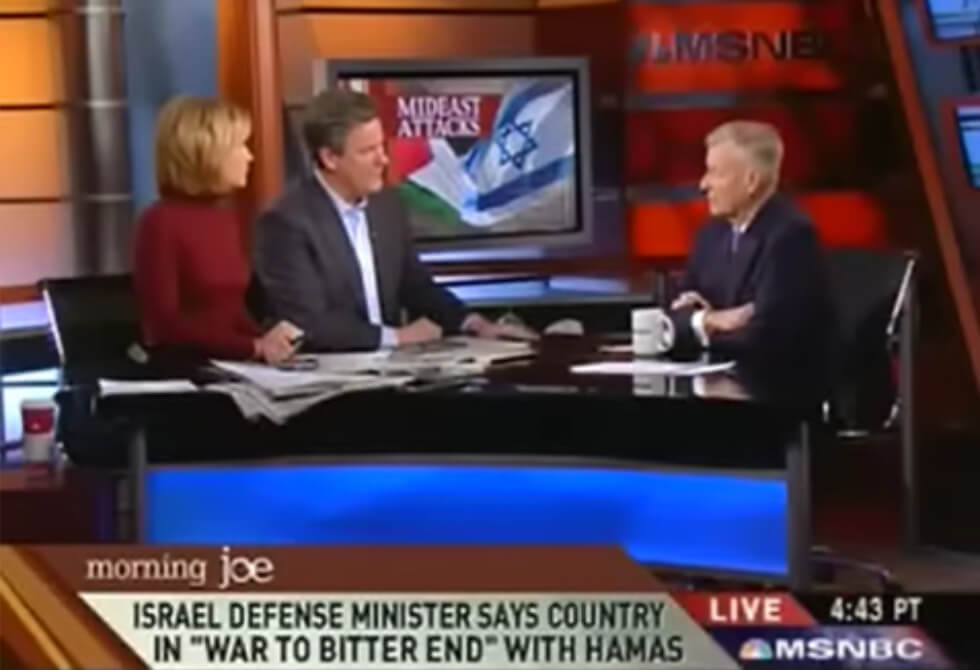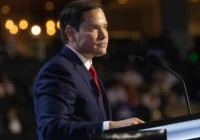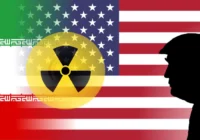On December 30, 2008, MSNBC’s popular program Morning Joe invited seasoned geopolitical thinker Zbigniew Brzezinski for an interview. This made sense. After eight years of “war president” George W Bush, the world wondered how a new Democratic administration led by the “peace candidate” Barack Obama might handle some of the literally burning global issues. As it underwent a financial meltdown that left the economy reeling, the US was still waging frustrating war in Afghanistan and Iraq. Who better than the author of the 1997 book The Grand Chessboard to clarify the new direction Obama might take after eight years of disastrous foreign policy under George W Bush?
To Scarborough’s surprise, the conversation quickly turned out to be slightly embarrassing. You can watch it here:
The discussion began with what even today every mainstream media commentator takes to be codified wisdom about Israel’s sacred right to self-defense when he solemnly asked his interlocutor, “What do we do the next time Israel is attacked from an outside force? What do we do at that point?”
Brzezinski brutally responded that it was “the wrong question.” Scarborough seemed shocked by his guest’s impertinence. Speaking from the position of regal authority that hosting a news show on MSNBC confers on him, Scarborough shot back by denying it was the wrong question before explaining what he believed to be the real problem: “We never get the condemnation of Hamas or Hezbollah. It’s always after Israel responds to defending itself.”
Brzezinski calmly responded, explaining that the conflict had “lasted for years and the United States has been largely passive, so the right question is not: ‘What do we do when things break down?’ The right question is: ‘What do we do to avoid a breakdown by being engaged seriously in the peace process.’”
Brzezinski then went on to explain that the failure to do so led to “the mess” that had become visible in 2009. This was too much for Scarborough, who had served as a Republican member of Congress from 1995 to 2001. Taking offense at the suggestion that Republicans had created the mess, he set the rules on what was and was not permitted. “You cannot blame what’s going on in Israel on the Bush administration.”
Unperturbed, the knowledgeable expert remained calm but couldn’t hold back. “You know, you have such a stunningly superficial knowledge of what went on that it’s almost embarrassing to listen to you.”
Today’s Weekly Devil’s Dictionary definition:
Stunningly superficial knowledge:
The entire set of talking points adopted and enforced by members of the corporate media in the United States, who consider it their duty to repeat those talking points endlessly, even in the face of visible facts on the ground or the honest discourse of truly informed observers that incontrovertibly reveal them to be false.
Contextual note
This interview contains a curious tragi-comic twist that could not have been apparent at the time. In early 2017, eight years later, Scarborough became secretly engaged to his co-host Mika Brzezinski, the diplomat’s daughter. In that same month of May, Zbigniew died. Six months later, the marriage took place. At the time of the interview, Mika’s father could not have guessed that he was insulting the man destined to become his future son-in-law. At the time, Joe was happily married, at least until his divorce in 2013.
This interview took place in the transitional period between Obama’s election and his inauguration. The “Gaza war” of 2008 had begun three days earlier, a three-week war that resulted in the death of 1,400 Gazans, 13 Israelis and the destruction of 46,000 homes, leaving 100,000 homeless.
The media at the time treated the exchange between Joe and Zbigniew as at best an amusing anecdote. It takes on vastly more significance today with a new war in Gaza threatens to trigger a new world war. Fifteen years on, it tells us more about how the media has evolved, or rather failed to evolve since then. This time, Joe’s father-in-law cannot be present to highlight the media’s — and not just Joe’s — stunning superficiality.
Half a century ago, in the age of Walter Cronkite on CBS and Huntley and Brinkley on NBC, a news media figure lecturing an expert would have been unthinkable. Those journalists treated the news with humility. They sought to hear what the experts they interviewed would say. They refrained from spouting the government’s slogans at them.
Today’s news hosts and interviewers tend to be eponymous stars of shows highlighting their names. Whether its Morning Joe, Piers Morgan, Rachel Maddow or Tucker Carlson, these personalities see their mission as converting the audience to their position on politics, which generally represents somebody’s party line. Brzezinski was right to call Scarborough’s lazy thinking the repetition of “slogans.”
Fifteen years later, Scarborough continues to demonstrate his allergy to any form of critical thinking. On May 12, he posted on X a piece of obvious fake news that was quickly debunked. Scarborough has still not retracted it. The tweet reads: “UN halves estimates of women and children killed in Gaza. Apparently, the Hamas figures repeatedly cited are false.”
Scarborough’s figures, not the UN’s, are false. “Superficial” would be too kind an epithet to use today.
Historical note
Zbigniew Brzezinski counseled President Lyndon Johnson on foreign policy between 1966 and 1968. He earned his media stripes and became known to the public eight years later when Jimmy Carter made him the his foreign policy wizard. He thus replaced Richard Nixon’s and then Gerald Ford’s Henry Kissinger as the “international brain” of the White House. The 1970s were that curious decade in which presidents felt obliged to feature a powerful thinker in their team to justify their foreign policy. Nixon had Kissinger; Carter chose Brzezinski.
Both achieved stardom thanks to their deep knowledge and strategic thinking. That doesn’t mean the policies they promoted were destined to prove more effective. They were simply better thought-out.
As a number of his obituaries last November revealed, many serious commentators today consider Kissinger an unmitigated war criminal. Brzezinski famously promoted the idea of the “Afghan trap” that pushed the US to support Afghan mujahideen fighters against the Soviets after their invasion. In retrospect, he was playing the sorcerer’s apprentice. That policy spawned the rise of Islamic fundamentalism as a powerful and uncontrollable political force throughout the Middle East that also spilled into Europe.
Kissinger’s promotion of the “peace process” in the Middle East may have had similar effects, leading to today’s genocidal campaign and existential crisis. “The genius of [Kissinger’s] peace process,” according to US diplomat, Martin S. Indyk, “is that it wasn’t designed to produce peace, but it was designed to produce order.” The order it produced “made it possible for Israel to buy time,” which ultimately nourished the hegemonic obsession of Israel’s leaders.
Our civilization has shown a talent for letting local problems, deemed to require hegemonic leadership, spin out of control. We see it in Ukraine. We see it again in Gaza. It’s time to begin asking itself a deeply embarrassing question about how we frame the problems we seek to address. Are subtle thinkers like Brzezinski and Kissinger more dangerous than stunningly superficial media figures like Joe Scarborough? If Morning Joe, Rachel Maddow and Piers Morgan were the voices guiding our leaders, would the outcomes be better?
In reality, the “great strategists” and the media people are playing out their respective roles in a spectacle that not only has room for both but has found subtle ways of getting them to work side by side within the same dysfunctional system, even when they disagree. That’s because politicians manage the space between the two. Brzezinski’s explanation of the peace talks should have definitively settled the question of Yasser Arafat’s supposed “refusal” of the two-state solutions. And yet Hillary Clinton gets mountains of airtime making the same false claim as Scarborough even today.
At the end of the 2008 interview, Scarborough sarcastically “admitted” that he was “listening to the mainstream media too much.” He had cited The New York Times, The Washington Post and Foreign Affairs as his sources that he would now have to abandon.
Would he had actually done so 15 years ago!
*[In the age of Oscar Wilde and Mark Twain, another American wit, the journalist Ambrose Bierce produced a series of satirical definitions of commonly used terms, throwing light on their hidden meanings in real discourse. Bierce eventually collected and published them as a book, The Devil’s Dictionary, in 1911. We have shamelessly appropriated his title in the interest of continuing his wholesome pedagogical effort to enlighten generations of readers of the news. Read more of Fair Observer Devil’s Dictionary.]
The views expressed in this article are the author’s own and do not necessarily reflect Fair Observer’s editorial policy.
Support Fair Observer
We rely on your support for our independence, diversity and quality.
For more than 10 years, Fair Observer has been free, fair and independent. No billionaire owns us, no advertisers control us. We are a reader-supported nonprofit. Unlike many other publications, we keep our content free for readers regardless of where they live or whether they can afford to pay. We have no paywalls and no ads.
In the post-truth era of fake news, echo chambers and filter bubbles, we publish a plurality of perspectives from around the world. Anyone can publish with us, but everyone goes through a rigorous editorial process. So, you get fact-checked, well-reasoned content instead of noise.
We publish 2,500+ voices from 90+ countries. We also conduct education and training programs
on subjects ranging from digital media and journalism to writing and critical thinking. This
doesn’t come cheap. Servers, editors, trainers and web developers cost
money.
Please consider supporting us on a regular basis as a recurring donor or a
sustaining member.
Will you support FO’s journalism?
We rely on your support for our independence, diversity and quality.






